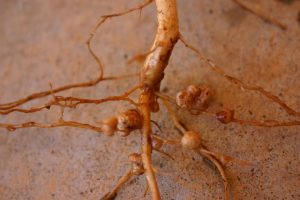

Nitrogen fixation is the conversion of dinitrogen, which is an inert gas, to reduced forms of nitrogen that are biologically available. This chemical reaction is an important process that regulates the nitrogen cycle and nitrogen availability in soil; it is performed by specialized bacteria, either in symbiosis with plant hosts or as free-living cells. Rhizobia are a general term for the types of bacteria that associate with legume plants to form nodules on roots, where nitrogen fixation occurs. Legumes and rhizobia can be used in a crop rotation to enhance nitrogen cycling in soils and reduce or replace synthetic fertilizer additions.
Do you have an excellent resource that isn’t listed here? Submit it for consideration.
Regional Educator Resources Other Educator Resources Technical Resources| Title | Source | Resource type and Date | Short Summary / Preview |
|---|---|---|---|
| Legume life cycle and characteristics | University of Minnesota | Extension Webpage |